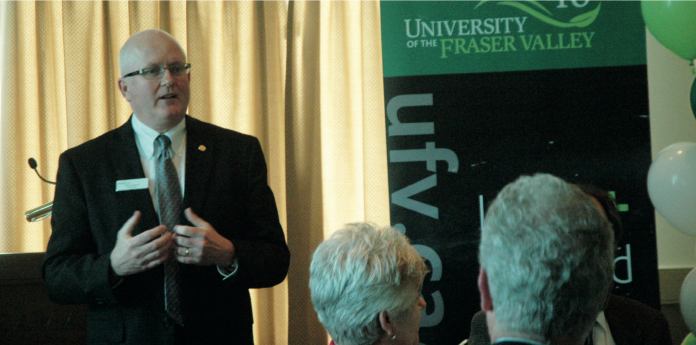According to the Universities Act, UFV must have the following positions on its Board of Governors:
– The chancellor
– The president
– 2 faculty members elected by the faculty members
– 8 persons appointed by the Lieutenant Governor in Council, 2 of whom are to be appointed from among persons nominated by the alumni association
– 2 students elected from students who are members of an undergraduate student society or graduate student society
– One person elected by and from the employees of the university who are not faculty members
Board sub-committees:
– Board executive committee plans and coordinates the presidential search process; sets goals and objectives for the president and deals with any compensation issues; they review the performance of the president; ensures effective government relations; they also approve membership of the university’s bargaining team, the Collective Bargaining Principles and Priorities, and the Collective agreement.
– Board finance & audit committee monitors the university’s significant financial planning, management, and reporting matters, makes recommendations and delivers reports to the Board of Governors
– Board governance committee provides a focus on governance to enhance the university’s performance
– Board nominating committee is responsible for identifying qualified candidates who may be appointed to the Board. They also inform potential candidates (both appointed and elected) of the responsibilities of Board members.
Some things BOG does:
– Selects, evaluates, compensates, and supports the president
– Along with Senate, monitors and reviews UFV’s vision and mission
– Approves and monitors UFV’s strategic directions, goals, and plans
– Establishes board leadership, codes of conduct, committees, ongoing education, evaluation, succession planning, and a criterion-based nomination process
– Provides for the appointment of staff, faculty, and senior officials to the university
– Approves and monitors UFV’s annual operating and capital budgets
– Protects the reputation and assets of the university
Questions and answers with Al Wiseman:
What does the Board of Governors do?
They ultimately are responsible for the success of the university and the direction it’s going, helping it, drive it forward, and to ensure the university is meeting its financial responsibilities. They handle things like risk management, approval of any sort of capital project that’s above a certain amount, the annual budgets. They’re really responsible to ensure the university runs the way it’s supposed to on a day-by-day, week-by-week, semester-by-semester experience.
What’s your role?
I’m the secretary. It’s kind of an archaic title really, but what that means is that I’m providing them with administrative and governance support and advice. They make all their rules, their bylaws, how they’re supposed to run, but they don’t know them really well, so I’m always there, I’m at all their meetings, I remind them of what their rules tell them they should be doing. I help them interpret them and I help when I see things that I think are problems with their bylaws and make suggestions for fixing them.
Why is the Board of Governors important?
They are ultimately the ones responsible to ensure the university’s success. If they’re not doing a good job of paying attention to what’s going on in the university, if the university starts having financial difficulties, that’s ultimately on the Board. If the university is having trouble keeping students happy, whether it’s about fees or what’s happening in the classroom, or if they feel like not enough services are provided for them, that falls on the Board. I think they’re really important from that perspective.
What is the role of the elected student members?
They’re elected every year. They get a one-year term. They have the absolute same responsibilities and expectations as any other board member. They serve on the Board’s committees and they come to all the board meetings, they vote on every motion, they are free to speak on any issue, and they could bring an issue to the Board if they wanted to. They’re really an equal participant in the governing process and one of 15 voices, one of 15 votes, one of 15 people responsible to say, “What are we going to do here that’s in the best interest of the university?”


